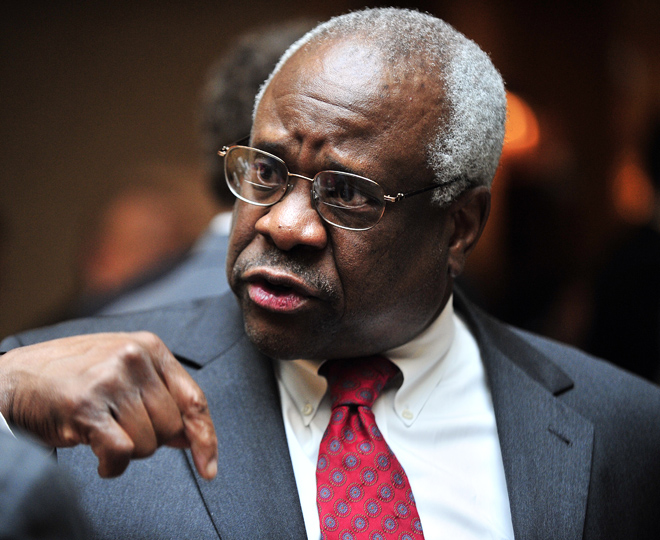Some degree of conflict of interest is inherent in any judge’s professional life — Justice Sonia Sotomayor, for instance, saw it necessary to recuse herself from at least 141 cases before she joined the Supreme Court — but when it comes to ethical complications on the nation’s highest court, Clarence Thomas takes the cake. Of particular concern is Thomas’ wife, Virginia, who founded a Tea Party-affiliated group called Liberty Central that opposes various progressive causes, including health care reform — an issue that’s almost certain to come before her husband’s court.
But an increasing number of revelations about Clarence Thomas’ own activities are raising questions about his impartiality. The New York Times reports that the real estate magnate Harlan Crow — a good friend of Thomas and a benefactor of his wife, to whom he gave $500,000 to help start Liberty Central — is now financing a multimillion-dollar restoration of an old Georgia cannery where Thomas’ mother once worked, at the justice’s behest.
These activities do not appear to be illegal, since Supreme Court justices are not required to abide by the ethics code that binds federal judges. Still, other justices have said they adhere to it, and Thomas’ apparent disregard of it is raising red flags.
The Times reports:
The code says judges “should not personally participate” in raising money for charitable endeavors, out of concern that donors might feel pressured to give or entitled to favorable treatment from the judge. In addition, judges are not even supposed to know who donates to projects honoring them.
While the nonprofit Pin Point museum is not intended to honor Justice Thomas, people involved in the project said his role in the community’s history would inevitably be part of it, and he participated in a documentary film that is to accompany the exhibits.
Deborah L. Rhode, a Stanford University law professor who has called for stricter ethics rules for Supreme Court justices, said Justice Thomas “should not be directly involved in fund-raising activities, no matter how worthy they are or whether he’s being centrally honored by the museum.”
In another potential conflict of interest, Thomas and Justice Antonin Scalia attended a political retreat run by the Koch brothers; their subsequent ruling in the Citizens United campaign finance case greatly benefited the Koch brothers’ political activities. The advocacy group Common Cause has asked the Justice Department to open an investigation into the propriety of the justices’ participation in the case.









